Once Upon a Summer Day (51 page)
Read Once Upon a Summer Day Online
Authors: Dennis L. Mckiernan

You may think it strange that the King Under the Hill ended up with all but two of his spearmen (pawns) collected on one side of the board, but with their diagonal capturing ability it is not beyond reason . . . after all, both Borel and the Fey Lord seemed to be playing somewhat recklessly.
And the Fairy King said, “Although the material is fairly balanced, I have the advantage, and it is certain that I will win, for you cannot stop at least one of my black spearmen from reaching the final row and transforming into a black queen.”
Borel studied the board. He had a king and a spearman and one tower left, whereas the High Lord had a king at one edge of the board with six spearmen at hand, all of them threatening Borel’s king and his spearman.
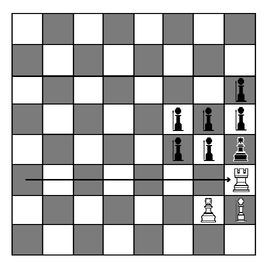
At last, Borel said, “Tower to white king’s tower’s three. Check.”
The High Lord said, “My prince, are you certain you want to make that move?”
“Indeed,” said Borel.
At this point, one might think that Borel had made a terrible move, for his most powerful piece in play was certainly his tower (rook castle), and here it seemed he was sacrificing it needlessly to a lowly spearman.
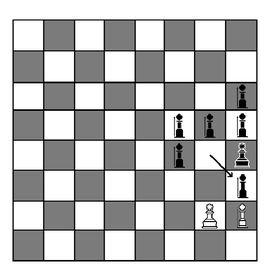
Oh, well . . .
“Very well,” said the Fairy King. “Spearman takes tower. Check. And now you have nought but a king and a single spearman left, whereas I yet have all my pieces. Surely you must concede.”
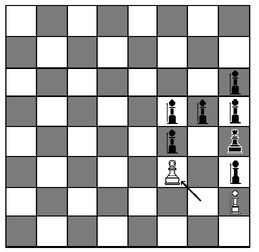
“Nay, my lord,” said Borel, “I do not concede. White king to white king’s hierophant’s three.”
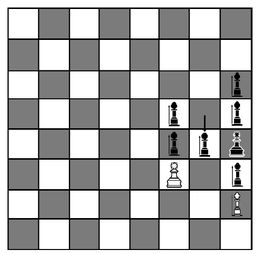
“Hmm . . .” said the Fairy King. “Black spearman to black king’s chevalier’s five. Check.”

Borel nodded and said, “I avoid the check thus: white king to white king’s hierophant’s four, taking a blocking black spearman.”
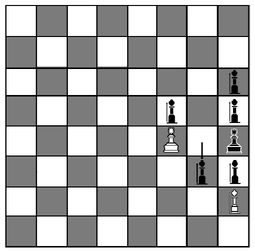
Now the Fairy King studied the board long. “I have but one move,” he said. “Black spearman to black king’s chevalier’s six.”
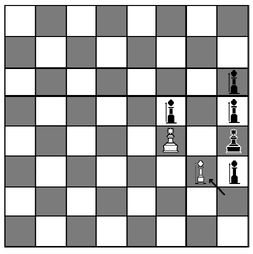
Borel laughed and said, “And my lone remaining white spearman takes that black spearman. Check.”
The Fairy King said, “Ah, Borel, I must make a move and yet cannot, for I am completely thwarted; my black king, he cannot move to the open space nor capture your single spearman, for to do either would bring him adjacent to your white king, and, of course, that cannot be. Ah, me, I must concede.” And he lay his black king on its side.
And thus did Borel win the game of échecs.
On another note: throughout this tale, I have relied upon the phases of the moon. I used the earth’s own moon cycles to do so, and I hope they correspond to those in that magical place. But perhaps I am quite mistaken in my assumptions . . . who knows? For, once you cross the twilight borders and enter Faery, strange and wonderful are the ways therein.
ONCE UPON A SUMMER DAY / 379
Lastly, I enjoyed “restoring” this fairy tale to its proper length, adding back those things I think should have been retained, but which I believe were omitted bit by bit down through the ages. I hope you enjoyed reading it.
Dennis L. McKiernan
Tucson, Arizona, 2005
Tucson, Arizona, 2005
About the Author
B
orn April 4, 1932, I have spent a great deal of my life looking through twilights and dawns seeking—what? Ah yes, I remember—seeking signs of wonder, searching for pixies and fairies and other such, looking in tree hollows and under snow-laden bushes and behind waterfalls and across wooded, moonlit dells. I did not outgrow that curiosity, that search for the edge of Faery, when I outgrew childhood—not when I was in the U.S. Air Force during the Korean War, nor in college, nor in graduate school, nor in the thirty-one years I spent in research and development at Bell Telephone Laboratories as an engineer and manager on ballistic missile defense systems and then telephone systems and in think-tank activities. In fact I am still at it, still searching for glimmers and glimpses of wonder in the twilights and the dawns. I am abetted in this curious behavior by Martha Lee, my helpmate, lover, and, as of this writing, my wife of over forty-six years.
orn April 4, 1932, I have spent a great deal of my life looking through twilights and dawns seeking—what? Ah yes, I remember—seeking signs of wonder, searching for pixies and fairies and other such, looking in tree hollows and under snow-laden bushes and behind waterfalls and across wooded, moonlit dells. I did not outgrow that curiosity, that search for the edge of Faery, when I outgrew childhood—not when I was in the U.S. Air Force during the Korean War, nor in college, nor in graduate school, nor in the thirty-one years I spent in research and development at Bell Telephone Laboratories as an engineer and manager on ballistic missile defense systems and then telephone systems and in think-tank activities. In fact I am still at it, still searching for glimmers and glimpses of wonder in the twilights and the dawns. I am abetted in this curious behavior by Martha Lee, my helpmate, lover, and, as of this writing, my wife of over forty-six years.
Other books
The Billionaire's Longshot: Betting on You Series: Book Three by Winters, Jeannette
Here Be Dragons by Stefan Ekman
Margaret and the Moth Tree by Brit Trogen, Kari Trogen
1305 & 1306 The Oracle & the Vampire (The 13th Floor) by Christine Rains
Náufragos by Miguel Aguilar Aguilar
The Trespassers by Laura Z. Hobson
The Sheriff and the Mayor by Starla Kaye
The World Was Going Our Way by Christopher Andrew
Beautiful Assassin by Michael C. White
JACKED by Sasha Gold